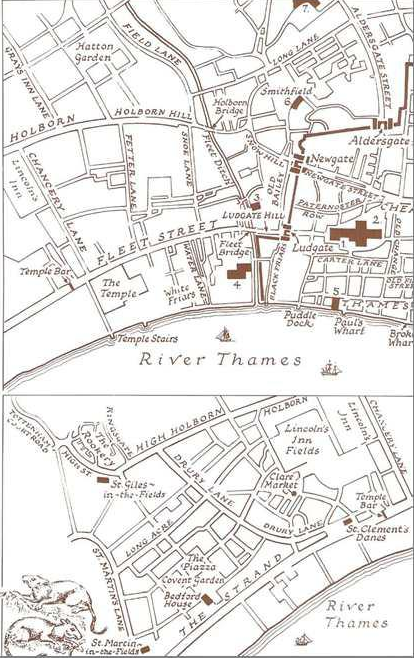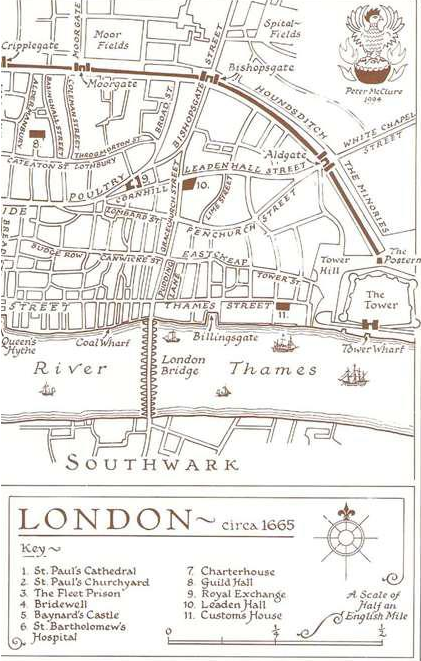The Vizard Mask
Authors: Diana Norman
Tags: #17th Century, #United States, #England/Great Britian, #Prostitution, #Fiction - Historical


The Vizard Mask
Diana Norman
LONDON NEW YORK SYDNEY TORONTO
This edition published 1994 by BCA by arrangement with Michael Joseph Ltd
Copyright © Diana Norman 1994
All rights reserved. Without limiting the rights under copyright reserved above, no part of this publication may be reproduced, stored in or introduced into a retrieval system, or transmitted, in any form or by any means (electronic, mechanical, photocopying, recording or otherwise) without the prior written permission of both the copyright owner and the above publisher of this book
The moral right of the author has been asserted
Also by Diana Norman:
Fiction
Fitzempress' Law
King of the Last Days
The Morning Gift
Daughter of Lir
The Pirate Queen
Non-fiction
The Stately Ghosts of England
Road From Singapore
Terrible Beauty
To Bertie and Oliver Norman


Author's Note
There was a Restoration actress called Peg Hughes and she was the first woman to play Desdemona on stage. She became Prince Rupert's mistress and bore him a child, Ruperta. I have adapted and elaborated what little is known about her life to my purposes, including in it a few - though by no means all — of the humiliations imposed on those real-life first actresses.
William III, while still a very young Prince of Orange, was made roaring, door-battering drunk during his first visit to England.
The King Philip War as it was called, between the New England settlers and the Indians in 1675, is said to have cost proportionally more lives than any war fought by Americans since.
Judge Jeffreys's treatment of the rebels is true to the record, though I've swopped the trials' locations here and there. He died in the Tower.
Aphra Behn's title should be more than that of the first woman to earn her living by her pen. Oroonoko was translated into French and German and became popular in France during the French revolutionary period. In England it was reprinted repeatedly during the eighteenth century and, along with the play adapted from it by Southerne, helped form part of the literature of the abolitionist movement which became a political force a century after Aphra's death.
Like all women who break out of the stereotype she was subjected to the process that begins with detraction and ends in oblivion. The nineteenth century, when she was mentioned at all, found it necessary to apologize for her. By the beginning of the twentieth she had all but disappeared. An article in 1913 by a Mr. Ernest Bernbaum declared that she never went to Surinam, never spied on the Dutch for Charles II - despite evidence in the State Papers that she did - virtually, that she didn't exist.
The lines on her tombstone in the east cloister of Westminster Abbey are typical of the smart, uncaring age she lived through and are said to have been written by John Hoyle:
Here lies proof that wit can never be Defence against mortality.
A more accurate memorial is in Virginia Woolf's A Room of One's Own where she points out that genius is a succession: 'Jane Austen should have laid a wreath upon the grave of Fanny Burney, and George Eliot done homage to the shade of Eliza Carter ... all women together ought to let flowers fall upon the tomb of Aphra Behn, for it was she who earned them the right to speak their minds.'
Incidentally, there is no evidence for the fight between her friends and the Chapter of Westminster Abbey over that same tomb.
But she should have been buried in Poets' Corner.
BOOK I

Chapter 1
Penitence Hurd and the Plague arrived in London on the same day.
Penitence was eighteen and carried a beaded satchel.
The Plague travelled by fur-lined carriage and was as old as sin. It had been to London before - part of it had never left - but this time conditions were perfect for its purpose. The summer of 1664 had been the hottest in living memory and an overcrowded population was being swelled daily by workers in the luxury trade catering for the merry monarchy of Charles II — the number of ribbon-makers alone ran into thousands. In the poor areas people were crammed so close they breathed in air that had just been breathed out by everybody else.
Master Endicott, captain of the Deliverance, was being flustered by Customs men. Thee wait now, Pen, until I can take thee to the minister.'
Penitence had no intention of waiting, especially for a minister. Her experience with the Reverend Block back in Massachusetts had rendered her fearful of all ministers. She stood still until Master Endicott took the Customs men into the hold and then she scurried down the gangplank.
From another ship further along the Plague was carried down a hawser to the wharf.
A rat whisked across Penitence's path, but she barely noticed it. She'd encountered rats before, it was London she was new to. The smell along this piece of its river frontage was a combination of dockside and country; the stink of fish, tar and dirty water was almost wiped out by the manure rotted on the towering heaps of dung gathered from the streets, ready to be shipped to the gardens of Whitehall.
But it was the noise. Drivers of wagons going down to the wharf altercated with the drivers of wagons coming up. Wheels rumbled as dockers yelled, ships and cranes creaked, rigging flapped and water-boatmen called 'Ho's' eastward and westward. Beyond it all, like a titanic millwheel, was the resonance of a city that shook with the vibration of half a million people.
Deafened, Penitence just in time jumped out of the way of a wagon carting strong-smelling wool. 'Some trust in chariots, and some in horses,' she scolded it, 'but we will remember the name of the Lord our God. Psalm 20, verse 7.' She glanced up at the sun to take her bearings. It was setting now, and London Bridge with its houses was a black cut-out against vermilion.
'West.' To go west she had first to go north along the narrow, loomed-over street that had led up from the river, but she turned left as soon as she could. Politely, she dropped a curtsey to everyone in her path, but, since that meant bobbing up and down like a sanddipper and nobody saluted her back, she became tired of the exercise. "They have mouths but they speak not: eyes have they but they see not. Noses have they and they smell ... awful.' The school joke was to cheer herself up. Master Endicott, bless him, had tried to tell her. Thee cannot contain the thought of it, Pen. 'Tis a Leviathan. Thee could put all Boston in one of its parishes and lose it.'
He was right; she had been unable to imagine it. She was used to distant horizons. Here the few open spaces were cross-angled by buildings that blocked in her vision, buildings that bent over her, seeming to shuffle up and claim her attention with beautiful woodwork and worn gargoyles. Overhead a forest of signboards splattered her face with raindrips from an earlier shower as she gawped up at them.
She was an odd figure, her neatness pointing up the chaos through which she moved. Her black dress covered her thin body from her throat down to the tops of her ploughboy boots and showed that she had no breasts to speak of and was stiff-backed. Her walk was ungainly for a woman, the lope of one who covers long distances easily. Plainer women were more attractive than she was because Penitence Hurd not only was not aware that she had beauty, but would have been ashamed of that fact if had she known it.
Even without the high-crowned hat — its buckle exactly centred - covering every inch of her hair, she would have declared herself a Puritan by her care to avoid physical contact with passers-by and the purse of her lips as she looked about her. London had known that look during the days of the Commonwealth; it had toppled maypoles, cancelled Christmas, closed theatres, killed its king and forbidden sin. Now it had set up a new king along with the maypoles, the bears were back, sin was in fashion, and no disapproving sniff from Penitence Hurd's nose was going to get rid of them, thank her kindly. She sniffed on, occasionally jeered at as an oddity by rude boys, though no more than they jeered at beggars, madmen, amputees, soldiers, richly dressed women and jugglers in this modern Babylon. Men and women openly tumbled each other in the doorways of taverns. Others fought, some vomited. A lady in a carriage passed by with her bosom exposed and was not arrested.
‘Tis an habitation of dragons.' Crime she had expected, but not this engulfing wickedness, not foul words from men as she passed, not a flaunting of sin that was an aggression aiming itself at her, as if hers alone was the innocence it meant to destroy.
‘The souls of the righteous are in the hand of God, and there shall no torment touch them.' Clutching her righteousness and her satchel, Penitence travelled on. The sun had long gone down, but, instead of retiring to bed like a Christian, London lit the flambeaux in its streets, illuminated its windows and intensified its wickedness.
A crowd at the top of Ludgate Hill stopped Penitence's progress and in trying to press through it she was trapped between a wall and a well-covered gentleman. Penitence's hat had been pushed to the back of her head and, glancing round, the well-covered gentleman saw her eyes. 'Keep close.' Unable to do anything else, Penitence kept close as, shouting 'Make way', the gentleman whacked a path with his staff for them both through to the front. 'Get along there.'
His was the first amiable countenance she'd seen since leaving Master Endicott and, as she couldn't move anyway, Penitence stayed by him.
'Sir John Lawrence, heard of him?' asked her new acquaintance.
Penitence shook her head.
'He's our new Lord Mayor, Sir John. Queenhithe man. Being chaired today. And what do you think of our little city?' It was a rhetorical question. Penitence's acquaintance was revelling in unfolding the wonders of it to this country bumpkin.
Trumpets and drums sounded in the distance, the crowd began cheering the empty street in anticipation until runners in the King's livery and carrying torches filled it. 'Now then,' said the well-covered gentleman, 'here they be.'
The City and Charles II were still on their honeymoon, and a wild affection suffused the crowd as coaches carrying the court presaged that of the King's. Penitence's acquaintance showed off, sweeping his hat to each coach, listing his familiarity with the great in a litany of names for his own benefit as much as Penitence's. 'Count Cominges, the Frog. Hyde, the old devil. Duke of Buckingham. Albemarle. Southampton. Arlington. Ormonde ... and here he is, bless him. Got the Queen with him tonight.'
